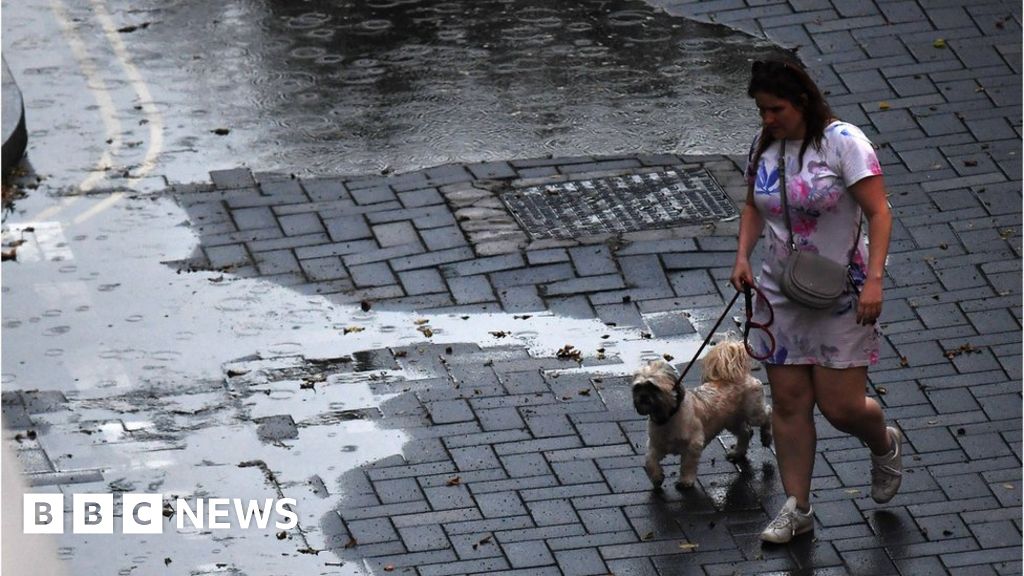
By Andre Rhoden-Paul & Alex Binley
BBC News
Watch: Lightning strikes light up Scottish skies
Parts of Scotland have been hit by a week’s worth of rain in just 24 hours as downpours batter the UK after days of hot, dry weather.
The Met Office issued yellow warnings for thunderstorms in England and Wales, with travel disruption, power cuts and lightning possible later.
The heavy rain will continue to move south through the day.
The Environment Agency has put out nearly 20 flood alerts in areas of the Midlands and south-east England.
The heatwave was the longest in 15 years in south-east England, with temperatures passing the threshold of 28C on nine consecutive days.
Image source, Christopher Furlong/Getty Images
After a lack of rain for weeks across much of the UK, heavy rain has hit much of the country.
By 07:00 BST, Strathallan near Perth had seen 55.2mm of rain fall in less than 24 hours. This is 71% of the 77mm the area normally sees in August.
The heavy rain led to flooding on tracks at Perth and a signalling fault, while speed restrictions of 40mph were put in place across vast swathes of the rail network.
BBC Weather presenter Jennifer Bartram said while heavy rain in August is not unusual, it “is perhaps causing problems as a result of how dry it’s been in the lead up”.
Image source, Network Rail Scotland
Flooding on train tracks in Perth in Scotland caused a signalling fault.
On the roads, Traffic Scotland warned surface water was affecting many routes and urged motorists to take care.
A yellow weather warning has now ended in Scotland but warnings remain in place for most of England and Wales on Tuesday, and southern England on Wednesday.
A yellow warning means flooding of homes and businesses could happen quickly, with fast flowing or deep floodwater possible, causing a danger to life.
Southern England will bear the brunt of the heavy rain, with hail and frequent lightning and flash flooding possible, and the yellow weather warning continuing until the end of Wednesday.
Image source, TRAVEL SOMERSET
50 tonnes of mud and potatoes were washed onto a road in Somerset by heavy rain on Monday.
Weeks of little rain caused drought across parts of the UK but the next few days is unlikely to ease the parched conditions because rainwater struggles to permeate dry ground, meaning it will run off the dehydrated surface and lead to flash flooding in some areas.
Met Office spokesperson Stephen Dixon advised anyone who lives in an area prone to flooding to “have a grab bag with things like water and insurance details and anything you might need, ready to go”.
He added people who feel their property is vulnerable to flooding could consider moving valuables upstairs.
One weather watcher in Newquay posted a video of torrential rain leading to flooding.
Despite the rain, the Environment Agency declared a drought in Yorkshire on Tuesday, the first since autumn 2018.
Meanwhile, hosepipe bans are set to remain in place on the Isle of Man and in Kent and Sussex, and Thames Water has said one will come into force in “the middle of next week”.
“We’ve had less than 65% of the usual rainfall in this year,” Cathryn Ross, the body’s strategy and regulatory affairs director said.
“We’ve had an extraordinarily hot dry July and August and frankly if we were going to avoid a ban at this stage it would probably have to drizzle for about three months, and it’s probably not going to do that.”
Thames Water covers Greater London, the Thames Valley, Gloucestershire and north Wiltshire.
Hosepipe bans will also come into force in:
Image source, Alamy
Rain did not dampen the spirits of spectators at the Fringe festival in Edinburgh.
Amidst these bans, some water companies have been told to “up their game” by the head of the water regulator for England and Wales, as he defended the regulator’s record of holding water companies to account.
Asked on BBC Radio 4’s Today Programme, David Black, chief executive of Ofwat, said: “No, I think that companies like Thames and Southern really need to up their game.
“When we see poor performance [it] is quite simply unacceptable,” he added.
Daily demand for water in England and Wales was 14 billion litres (three billion gallons), on average in 2018. In periods of hot weather this is likely to be higher.
But each day, another three billion litres was lost through leakage, according to a National Audit Office (NAO) report.
Image source, Getty Images
How have you been affected by the storms and heavy rain? Email haveyoursay@bbc.co.uk.
Please include a contact number if you are willing to speak to a BBC journalist. You can also get in touch in the following ways:
If you are reading this page and can’t see the form you will need to visit the mobile version of the BBC website to submit your question or comment or you can email us at HaveYourSay@bbc.co.uk. Please include your name, age and location with any submission.

0 Comments :
Post a Comment